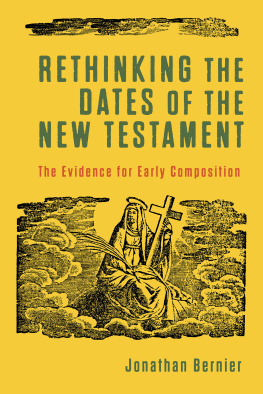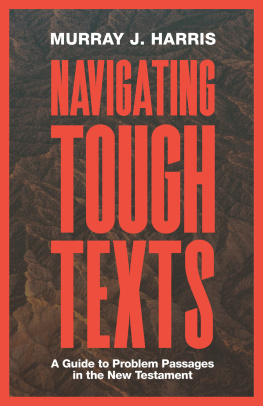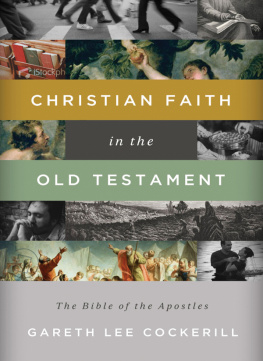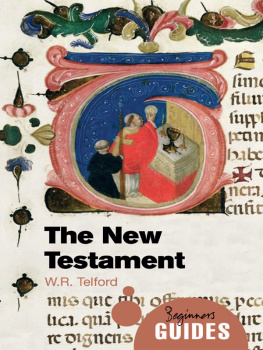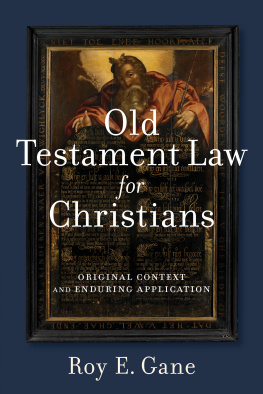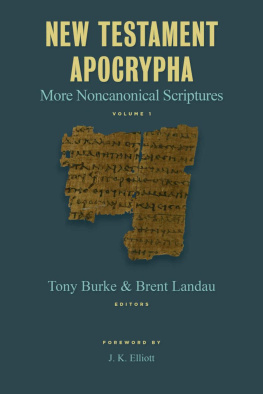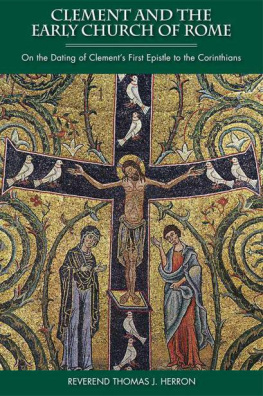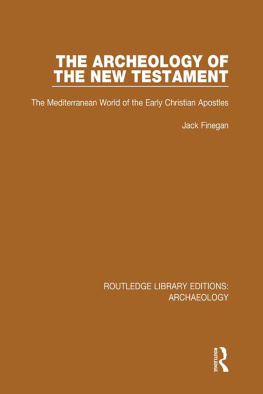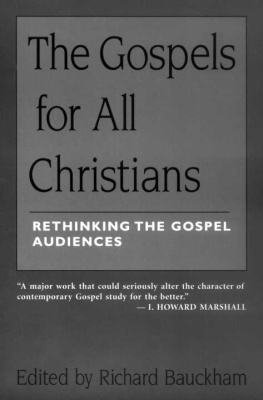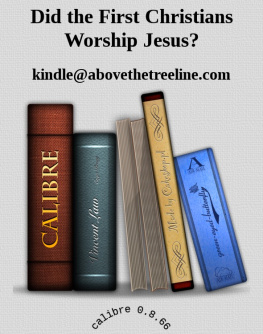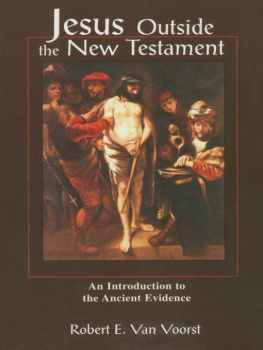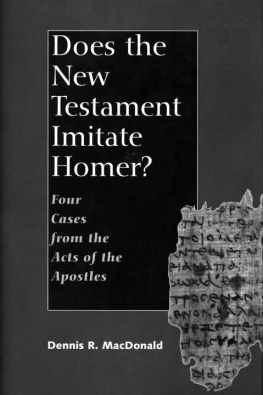Jonathan Bernier - Rethinking the Dates of the New Testament: The Evidence for Early Composition
Here you can read online Jonathan Bernier - Rethinking the Dates of the New Testament: The Evidence for Early Composition full text of the book (entire story) in english for free. Download pdf and epub, get meaning, cover and reviews about this ebook. year: 2022, publisher: Baker Publishing Group, genre: Religion. Description of the work, (preface) as well as reviews are available. Best literature library LitArk.com created for fans of good reading and offers a wide selection of genres:
Romance novel
Science fiction
Adventure
Detective
Science
History
Home and family
Prose
Art
Politics
Computer
Non-fiction
Religion
Business
Children
Humor
Choose a favorite category and find really read worthwhile books. Enjoy immersion in the world of imagination, feel the emotions of the characters or learn something new for yourself, make an fascinating discovery.
- Book:Rethinking the Dates of the New Testament: The Evidence for Early Composition
- Author:
- Publisher:Baker Publishing Group
- Genre:
- Year:2022
- Rating:3 / 5
- Favourites:Add to favourites
- Your mark:
- 60
- 1
- 2
- 3
- 4
- 5
Rethinking the Dates of the New Testament: The Evidence for Early Composition: summary, description and annotation
We offer to read an annotation, description, summary or preface (depends on what the author of the book "Rethinking the Dates of the New Testament: The Evidence for Early Composition" wrote himself). If you haven't found the necessary information about the book — write in the comments, we will try to find it.
Jonathan Bernier: author's other books
Who wrote Rethinking the Dates of the New Testament: The Evidence for Early Composition? Find out the surname, the name of the author of the book and a list of all author's works by series.
Rethinking the Dates of the New Testament: The Evidence for Early Composition — read online for free the complete book (whole text) full work
Below is the text of the book, divided by pages. System saving the place of the last page read, allows you to conveniently read the book "Rethinking the Dates of the New Testament: The Evidence for Early Composition" online for free, without having to search again every time where you left off. Put a bookmark, and you can go to the page where you finished reading at any time.
Font size:
Interval:
Bookmark:
As anyone who has studied New Testament chronology knows, the dates frequently presented to unsuspecting undergraduates as settled facts are often anything but. In Rethinking the Dates of the New Testament , Bernier presents a synthetic, comprehensive, and rigorously reasoned case for earlier composition. This book is a major contribution to the study of Christian origins. It not only needs to be read; it needs to be reckoned with.
Brant Pitre , Augustine Institute Graduate School of Theology
Bernier has written the go-to book on dating the collection of texts now known as the New Testament (and some of the Apostolic Fathers). Bernier provides the first dedicated work on New Testament chronology for the twenty-first century, and it is a resource that I desperately wished for in my earlier years as a student. He combines critical analysis with balanced judgments and communicates technical issues and problems in an easy-to-read, jargon-free way. I found myself surprised, challenged, and better informed. Anyone interested in the emergence of Jesus-movement literature and history must consult this book.
Isaac T. Soon , Crandall University
Chronology provides us with a window into the history of the earliest followers of Jesus and can help to establish an important piece of the contexts in which the books of the New Testament were written. In this rigorous yet accessible book, Bernier presents a compelling case for relatively early dates for the New Testament texts. Rethinking the Dates of the New Testament provides readable, fair, and concise presentations of the central questions, passages, arguments, and debates pertaining to the chronology of the composition of each book of the New Testament. This makes it a fantastic introduction to a key scholarly issue. At the same time, Berniers arguments are methodologically grounded and careful, resulting in evidence-based conclusions that are reasonable and responsible. The book is engaging and clear, making it a good resource for students, but it is also the sort of historically and logically rigorous work that will make it a must-read for anyone interested in historical approaches to the New Testament or early Christianity.
Jordan J. Ryan , Wheaton College
In this carefully argued study, New Testament scholar Jonathan Bernier addresses the deceptively simple but exceedingly complex question of when the texts included in the New Testamentas well as 1 Clement, the Didache, the Epistle of Barnabas, and the Shepherd of Hermaswere written. Most scholars routinely accept what has become the majority view regarding these dates without themselves engaging the multiple problems that lurk below the surface. Here we find, for the first time in fifty years, a full monograph dedicated to offering the reader a synthetic treatment of the issues involved. Regardless of whether one accepts Berniers conclusions, this book is the new must-read volume for anyone who wants to examine the dates of these ancient compositions.
Anders Runesson , University of Oslo
Bernier offers a much-needed corrective to the tendency for dates assigned to New Testament works to drift further in opposite directions due more to ideological preferences than to evidence, or to be placed in the middle of a possible range as though that were the best way to respond to our uncertainty. With careful attention to the evidence for each work, Bernier makes a strong case for dates that are often earlier than the scholarly consensus. He takes seriously our inability to be certain and precise about dates, never shying away from providing a range that starts astonishingly early or continues well into the second century when the evidence supports it. At the same time he never allows the range of possibilities to hinder arguing for what is likely . Whether by gaining wide acceptance or by prompting well-argued responses, Berniers book promises to shake up the scholarly study of the New Testament and some extracanonical Christian works. What Bernier has provided will undoubtedly serve as an impetus to refreshing scholarly conversations for decades to come.
James F. McGrath , Butler University, Indianapolis
2022 by Jonathan Bernier
Published by Baker Academic
a division of Baker Publishing Group
PO Box 6287, Grand Rapids, MI 49516-6287
www.bakeracademic.com
Ebook edition created 2022
All rights reserved. No part of this publication may be reproduced, stored in a retrieval system, or transmitted in any form or by any meansfor example, electronic, photocopy, recordingwithout the prior written permission of the publisher. The only exception is brief quotations in printed reviews.
Library of Congress Cataloging-in-Publication Data is on file at the Library of Congress, Washington, DC.
ISBN 978-1-4934-3467-1
Unless otherwise indicated, Scripture quotations are from the New Revised Standard Version of the Bible, copyright 1989 National Council of the Churches of Christ in the United States of America. Used by permission. All rights reserved.
Baker Publishing Group publications use paper produced from sustainable forestry practices and post-consumer waste whenever possible.
In memory of Sascha Kokott (19772019)
And in honor of Heidi Kokott
Endorsements
Half Title Page
Title Page
Copyright Page
Dedication
Acknowledgments
Abbreviations
Introduction
PART 1: The Synoptic Gospels and Acts
1. Synchronization
2. Contextualization and Authorial Biography
PART 2: The Johannine Tradition
3. The Gospel of John
4. The Epistles of John and Revelation
PART 3: The Pauline Corpus
5. Critical Matters in Dating the Pauline Corpus
6. The Compositional Dates of the Pauline Corpus
PART 4: Hebrews and the Letters of James, Peter, and Jude
7. Hebrews and James
8. 1 and 2 Peter and Jude
9. 1 Clement and the Didache
10. The Epistle of Barnabas and the Shepherd of Hermas
Conclusion
Bibliography
Author Index
Scripture and Ancient Writings Index
Subject Index
Back Cover
As is inevitable in a study of this size, I owe greater debts to a greater number of people than I could ever hope to repay or even mention. This problem is magnified by the fact that this project was fifteen years in the making, having begun during my doctoral studies as notes for my comprehensive examinations. What I expected to be an afternoons labor soon developed into a private obsession and eventually grew into a monograph. Nonetheless, I will here try to thank as many people as I can.
As always, I thank my parents, Anne and Alan Bernier, for their numerous forms of support over the years and my oldest and dearest friends, Jamie and Debra Lediet, and their children, Nicholas and Madison, for decades of friendship. Jamie in particular witnessed the roots of this study; no doubt the interests that led to this work were sown when we were children sitting in church together. And I thank our Sunday school teachers, Alwyn Conquest and his late wife, Elizabeth, for humoring our antics and inflaming our imaginations. More recently, Alwyn audited my course on Revelation at Regis College in Toronto, which was an honor since I first studied the book with any earnestness in his Sunday school class.
I thank William Acres, of Huron University College at the University of Western Ontario, for being my first academic mentor; my Doktorvater , Anders Runesson, then of McMaster University and now of the University of Oslo, not just for almost twenty years of friendship and mentorship but more concretely for being the first to raise the possibility that someone somewhere might actually be interested in reading my thoughts on the dates of the New Testament; Eileen Schuller and Stephen Westerholm, professors emeriti from the Department of Religious Studies at McMaster University, whose collective wisdom continues to inform both my teaching and my writing; my former doctoral classmates at McMaster University, John G. Bolton and Jordan Ryan, for probably hundreds of hours of conversations about the matters discussed within these pages; the many other wonderful staff, classmates, students, and faculty at McMaster University who over the years supported me and my work in so many ways, most notably Stephanie Balkwill, Kimberly Beek, Miriam DeCock, Caleb De Jong, Abigail MacBain, the late Camilla Mryglod, and Alisha Pomazon; Wally Cirafesi and Greg Fewster, for our incredibly fruitful group reading of John A. T. Robinsons Redating the New Testament almost a decade ago now; Bill Heroman, whose unflagging support for my work in general and this study in particular has been a constant source of encouragement; and my former students and colleagues at St. Francis Xavier University, especially Ronald Charles, Ken Penner, and Adela Sandness.
Font size:
Interval:
Bookmark:
Similar books «Rethinking the Dates of the New Testament: The Evidence for Early Composition»
Look at similar books to Rethinking the Dates of the New Testament: The Evidence for Early Composition. We have selected literature similar in name and meaning in the hope of providing readers with more options to find new, interesting, not yet read works.
Discussion, reviews of the book Rethinking the Dates of the New Testament: The Evidence for Early Composition and just readers' own opinions. Leave your comments, write what you think about the work, its meaning or the main characters. Specify what exactly you liked and what you didn't like, and why you think so.

